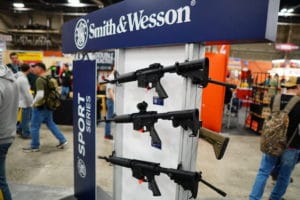A federal appeals court brought Mexico’s civil liability suit against the US gun industry back to life this week. Gun-control advocates are hoping the ruling provides an opening to hollow out the industry’s liability protections moving forward.
On Monday, a three-judge panel for the First Circuit Court of Appeals reversed a 2022 lower court order dismissing Mexico’s $10 billion lawsuit against America’s largest firearms manufacturers and wholesalers. The prior decision held that the companies could not be held liable for criminal gun trafficking through the southern border that they weren’t involved with under the federal Protection of Lawful Commerce in Arms Act (PLCAA).
In an unprecedented move, the First Circuit panel held that while the PLCAA does apply to the case—despite Mexico’s status as a foreign government alleging harms abroad—it does not prohibit the specific legal claims raised about the industry’s sales and marketing practices. Instead, the panel found that Mexico “plausibly alleges” that Smith & Wesson, Sturm Ruger & Co, Glock, Barrett, Beretta, Colt, Century Arms, and Boston-based wholesaler Interstate Arms aid and abet criminal gun trafficking by designing, marketing, and distributing “military-style weapons” that appeal to Mexican drug cartels.
In the immediate term, the ruling simply means that the case will once again go back to the trial court level, where to the suit will resume from where it left off in 2022. And Mexico has a high burden to meet in proving its claims have merit. But, over the longer term, the ruling could spell bad news for the gun industry as it’s forced to fend off more costly litigation using the latest tactic to pierce the PLCAA.
Passed with bipartisan support in 2005, the PLCAA generally shields gun manufacturers and sellers from legal liability for harm caused by a third party’s unlawful misuse of their products. It contains multiple exceptions, however, including damages caused by defective products and in cases where a manufacturer or seller knowingly violated a federal or state law when marketing or selling its firearms. This latter exception, also known as the “predicate exception,” formed the basis of the First Circuit’s decision.
Mexico alleges that the US gunmakers “knowingly” and “deliberately” produce and advertise weapons that gun traffickers and cartel members covet and that they continue to supply certain dealers with these weapons despite knowing which dealers are most frequented by criminal straw purchasers who then smuggle them through the southern border. In this vein, Mexico alleges that the gunmakers are active participants in an ongoing criminal gun trafficking scheme. This mere allegation, not yet supported by any hard evidence, was enough to convince the panel that the suit fell under the PLCAA’s predicate exception.
“It is therefore not implausible that, as the complaint alleges, defendants engage in all this conduct in order to maintain the unlawful market in Mexico, and not merely in spite of it,” Judge William J. Kayatta wrote in Mexico v. Smith & Wesson et al. “Of course, our holding at this stage is based on the allegations in the complaint, construed favorably to Mexico. Mexico will have to support its theory of proximate causation with evidence later in the proceedings.”
It’s hard to imagine that Mexico will ever be able to provide any hard evidence that the country’s largest and most iconic gun brands have been engaging in a conspiracy to willfully allow violent cartel members to purchase their firearms, especially since the allegation is centered on them making popular guns and selling them to licensed dealers who are overseen by the American government. The same can be said for the prospect of any evidence showing that cartel members are particularly motivated by tailored gun advertisements when deciding which weapons to illegally acquire.
Instead, what’s more than likely is that the case’s discovery process will be used as an opportunity to dredge up as much unflattering private information about the practices of these gun companies as possible. Meanwhile, the case’s continuation means the legal costs incurred by the companies defending against the suit will mount. The coalition of gunmakers may ultimately either be forced to acquiesce to a settlement or suffer financially by not doing so.
This would be in line with the playbook that emerged from the lawsuit filed by the families of the victims of the Sandy Hook shooting against Remington Arms Co. After the Connecticut Supreme Court refused to dismiss the suit against Remington under the PLCAA because of a marketing-based claim and allowed it to proceed to discovery, the gun maker went bankrupt a while later, and the defunct company’s insurers decided to enter into a $73 million settlement rather than continue to fight the case. That settlement also allowed the plaintiffs to release internal Remington documents obtained during discovery.
The First Circuit officially expanded the reach of that playbook by setting a federal precedent endorsing the legitimacy of such suits and allowing foreign governments to get in on the action. US gun-control advocates have already taken note of the potential it created.
Jonathan Lowy, Mexico’s co-counsel in the case, left his position as a long-time staffer for Brady to form the Global Action on Gun Violence, a gun-control group specifically focused on taking an international approach to targeting America’s gun laws. Lowy celebrated the First Circuit’s decision for its potential implications in future cases.
“Not only did the Court recognize the right of another country to sue U.S. gun companies, it also pierced the unfair legal shield that gun companies have been hiding behind since 2005,” he said in a statement.
His group is currently pursuing similar litigation with Mexico over a handful of Arizona gun dealers. He also filed a class action suit against Smith & Wesson in Canadian court, with plans to pursue more future legal challenges.
Indeed, much like the lawsuits that preceded the PLCAA and prompted its passage, gun-control advocates are again looking to hold gunmakers liable for the violence inflicted by armed criminals. Or, failing that, tie them up in costly litigation for years.






